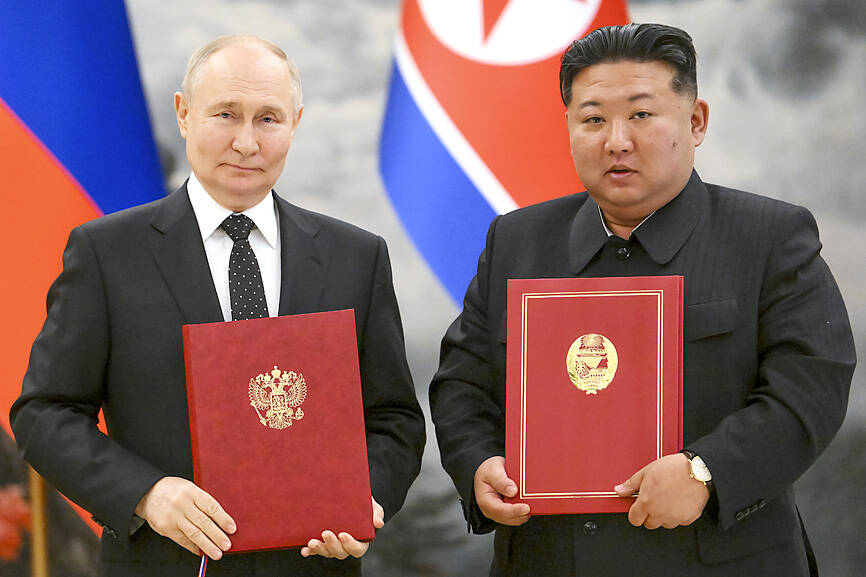North Korea yesterday confirmed for the first time that it had deployed troops to Russia, with state news agency KCNA reporting Pyongyang’s soldiers helped Moscow reclaim territory under Ukrainian control in the Russian border region of Kursk.
The admission comes just days after Moscow confirmed North Korea’s participation, while Russian President Vladimir Putin yesterday heralded the “feat” of Pyongyang’s troops.
South Korean and Western intelligence agencies have long reported that Pyongyang sent more than 10,000 troops to help in Kursk last year.

Photo: AP
North Korean forces “participated in the operations for liberating the Kursk areas,” North Korea’s Central Military Commission said in the KCNA report.
North Korean leader Kim Jong-un’s decision to deploy the troops, it said, was in accordance with a mutual defense treaty.
“They who fought for justice are all heroes and representatives of the honor of the motherland,” Kim said, KCNA reported.
Kim added that a monument to the “battle feats” would soon be built in the capital, and referred to “the tombstones of the fallen soldiers,” publicly confirming that North Korean troops had been killed in combat.
The nation must “take important national measures to specially honor and care for the families of war veterans,” Kim said.
The Russian president praised Moscow’s “Korean friends” for their backing in Kursk.
“We appreciate it a lot and are deeply grateful to comrade Kim Jong-un personally ... and the North Korean people,” the Kremlin cited Putin as saying.
Russian Chief of Staff Valery Gerasimov on Saturday said that North Korean troops “provided significant assistance in defeating the group of Ukrainian armed forces.”
The South Korean Ministry of National Defense yesterday said that Pyongyang “has admitted to its own criminal acts” which contravene UN Security Council resolutions.
China, North Korea’s key economic benefactor which has repeatedly condemned Western backing for Ukraine, declined to comment specifically on the admission from Pyongyang.
“China’s position on the Ukraine crisis issue is consistent and clear,” Chinese Ministry of Foreign Affairs spokesman Guo Jiakun (郭嘉昆) said.
Analysts believe the decision to publicly disclose the deployment had been agreed in advance by North Korea and Russia.
“They judged that the benefits of compensation for the troop deployment outweighed the potential damage to their international image,” said Yang Moo-jin, president of the University of North Korean Studies in Seoul.
By promising state benefits to the deployed troops, North Korea could also “sufficiently ease [any] internal backlash,” he said. “North Korea likely aimed to showcase that victory was achieved thanks to their involvement, thereby securing greater rewards from Russia.”
Despite Moscow claiming the “liberation” of its western region, Ukrainian President Volodymyr Zelenskiy on Sunday said that his military was still fighting in Kursk.

CROSS-STRAIT COLLABORATION: The new KMT chairwoman expressed interest in meeting the Chinese president from the start, but she’ll have to pay to get in Beijing allegedly agreed to let Chinese Nationalist Party (KMT) Chairwoman Cheng Li-wun (鄭麗文) meet with Chinese President Xi Jinping (習近平) around the Lunar New Year holiday next year on three conditions, including that the KMT block Taiwan’s arms purchases, a source said yesterday. Cheng has expressed interest in meeting Xi since she won the KMT’s chairmanship election in October. A source, speaking on condition of anonymity, said a consensus on a meeting was allegedly reached after two KMT vice chairmen visited China’s Taiwan Affairs Office Director Song Tao (宋濤) in China last month. Beijing allegedly gave the KMT three conditions it had to

STAYING ALERT: China this week deployed its largest maritime show of force to date in the region, prompting concern in Taipei and Tokyo, which Beijing has brushed off Deterring conflict over Taiwan is a priority, the White House said in its National Security Strategy published yesterday, which also called on Japan and South Korea to increase their defense spending to help protect the first island chain. Taiwan is strategically positioned between Northeast and Southeast Asia, and provides direct access to the second island chain, with one-third of global shipping passing through the South China Sea, the report said. Given the implications for the US economy, along with Taiwan’s dominance in semiconductors, “deterring a conflict over Taiwan, ideally by preserving military overmatch, is a priority,” it said. However, the strategy also reiterated

‘BALANCE OF POWER’: Hegseth said that the US did not want to ‘strangle’ China, but to ensure that none of Washington’s allies would be vulnerable to military aggression Washington has no intention of changing the “status quo” in the Taiwan Strait, US Secretary of Defense Pete Hegseth said on Saturday, adding that one of the US military’s main priorities is to deter China “through strength, not through confrontation.” Speaking at the annual Reagan National Defense Forum in Simi Valley, California, Hegseth outlined the US Department of Defense’s priorities under US President Donald Trump. “First, defending the US homeland and our hemisphere. Second, deterring China through strength, not confrontation. Third, increased burden sharing for us, allies and partners. And fourth, supercharging the US defense industrial base,” he said. US-China relations under

The Chien Feng IV (勁蜂, Mighty Hornet) loitering munition is on track to enter flight tests next month in connection with potential adoption by Taiwanese and US armed forces, a government source said yesterday. The kamikaze drone, which boasts a range of 1,000km, debuted at the Taipei Aerospace and Defense Technology Exhibition in September, the official said on condition of anonymity. The Chungshan Institute of Science and Technology and US-based Kratos Defense jointly developed the platform by leveraging the engine and airframe of the latter’s MQM-178 Firejet target drone, they said. The uncrewed aerial vehicle is designed to utilize an artificial intelligence computer